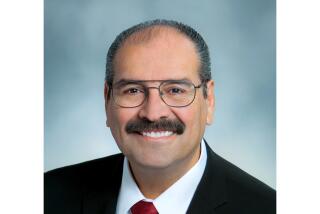Therapist Says Shielding Patients Cost Her Hospital Job
- Share via
A respiratory therapist testified Wednesday that she was fired after refusing to jeopardize the safety of patients by working an understaffed shift at a San Clemente hospital.
Gail F. Dabbs has said she was fired unfairly for protesting unsafe conditions at San Clemente General Hospital in 1983.
As the trial of her lawsuit opened, Dabbs, 50, of Laguna Beach said the incident began when her supervisor ordered her to work when staffing was insufficient.
“I did not feel comfortable,” Dabbs told jurors Wednesday in Orange County Superior Court in Santa Ana. “I said I needed help. It just seemed a dangerous situation. I wasn’t willing to risk the patients.”
Dabbs has alleged that she suffered depression as a result of the firing in April, 1983, and that it took her three years to find similar work at equivalent pay.
In the unusual lawsuit, which breaks new legal ground in the expanding field of worker rights, Dabbs said she was fired because she refused to violate the “public policy” of the state, in this case promoting patient care and safety. But the case was a long time coming to trial.
Her lawsuit, filed by William Crosby, was first thrown out of court, then reinstated in January, when a divided state court of appeal in Santa Ana ruled that Dabbs deserved to have a jury decide her claims. Last April, the state Supreme Court declined to hear an appeal, clearing the way for the trial.
Defendants are Cardiopulmonary Management Services Inc., a subsidiary of American Healthcare Management Inc., which provided respiratory services for the hospital.
Crosby has yet to specify the damages his client is seeking. According to papers in the court file, however, Dabbs believes that she has lost at least $30,000 in income from the termination’s effect on her career.
Crosby described Dabbs as a “mature, well-qualified, extremely conscientious woman who cared about her profession and the patients under her care.”
Dabbs testified that she reported to work on the 3-to-11 p.m. shift on April 19, 1983, and learned that she was expected to train a newly hired therapist, as well as provide patient care.
Two experienced therapists had been the minimum staff level before that night, Dabbs testified.
With three patients in the intensive-care ward on ventilators (mechanical breathing devices), Dabbs testified that she could not handle the load. Four qualified respiratory therapists had worked the day shift immediately preceding her work assignment, she said.
Dabbs testified that when she told her supervisor she needed help, he said he would try to arrange it, then told her 10 minutes later that he could not find anyone.
She then told him that she could not work the shift.
He replied, “This will go on your termination,” she testified.
However, Dennis Gladwell, attorney for the management firm, told jurors it was Dabbs who endangered patient safety by “walking off the job.”
Gladwell said Crosby was focusing on the firing in a bid to “divert attention from what Mrs. Dabbs failed to do.”
Gladwell insisted that there was nothing wrong with the hospital’s staff levels.
Dabbs testified Wednesday that six months before she was fired, she had found herself in a similar situation, working with just one inexperienced therapist to assist her.
She said a ventilator in the intensive-care unit malfunctioned, jeopardizing the patient. Dabbs said she had to remain with the patient, providing ventilation by hand, while the aide, who was unfamiliar with the hospital, tried unsuccessfully to find the part needed to repair the ventilator.
Had an emergency occurred elsewhere in the hospital, Dabbs said, there would have been nothing she could have done to help.
She resolved never to work under those conditions again, she testified.
Dabbs testified Wednesday that her refusal to work after the second staffing incident was based on her real belief of the danger. “I was not willing to jeopardize my patients to save my job,” she said.
Orange County Superior Court Judge Richard W. Luesebrink is presiding over the jury trial.
More to Read
Sign up for Essential California
The most important California stories and recommendations in your inbox every morning.
You may occasionally receive promotional content from the Los Angeles Times.










